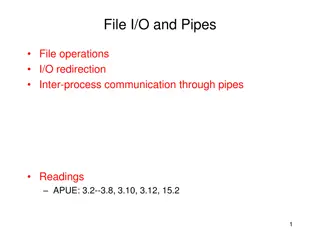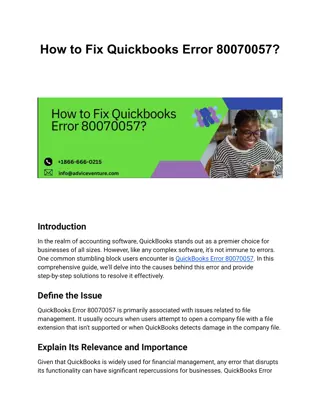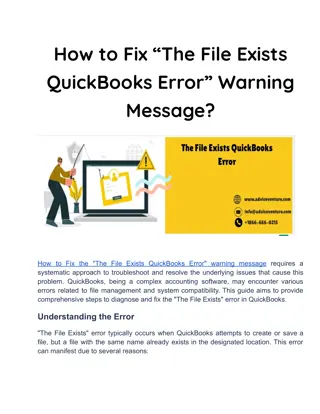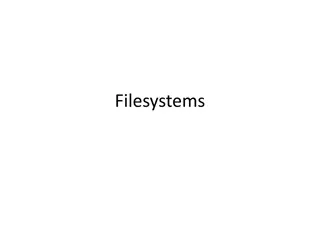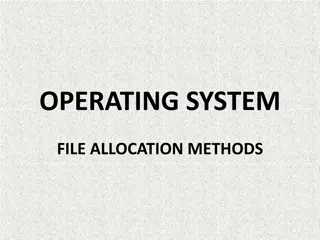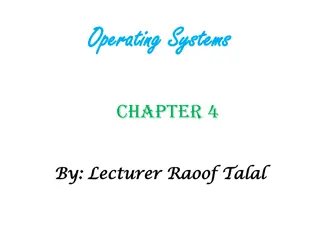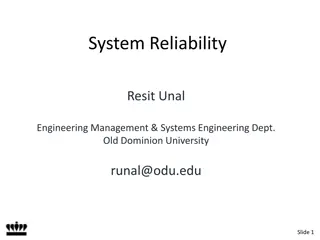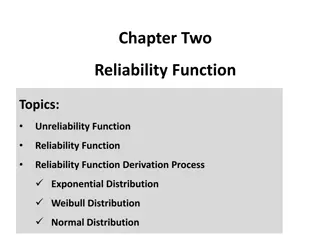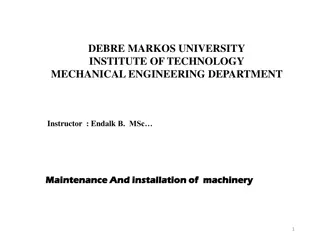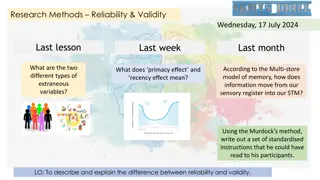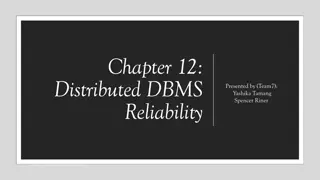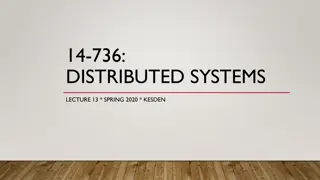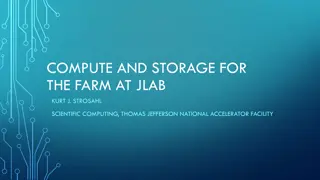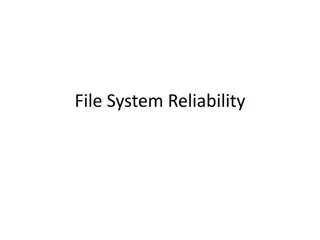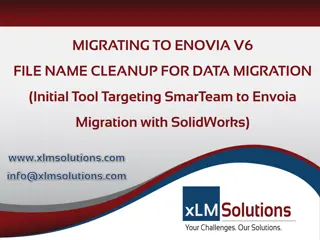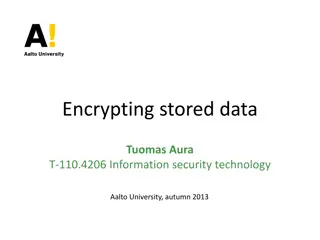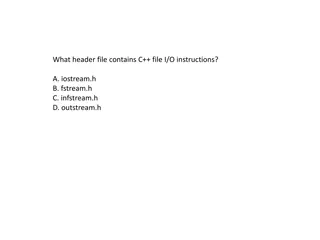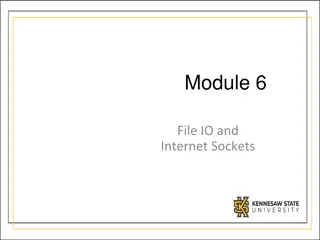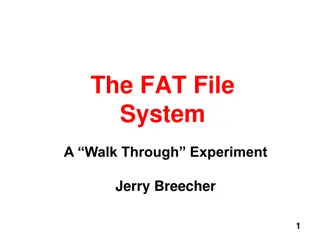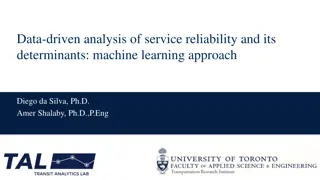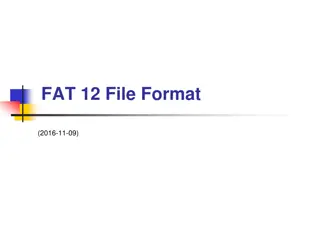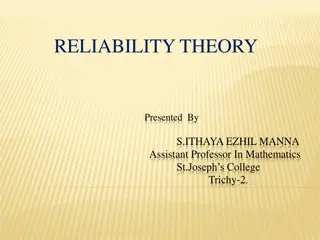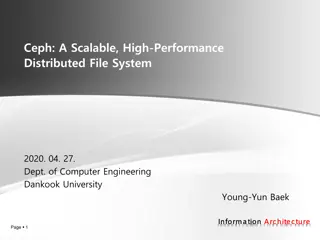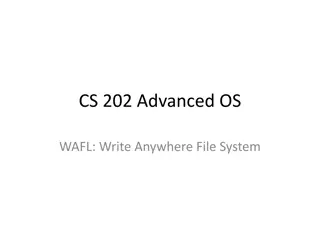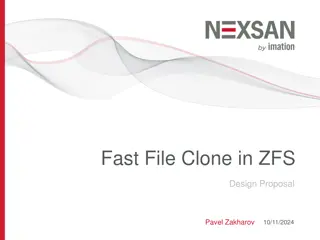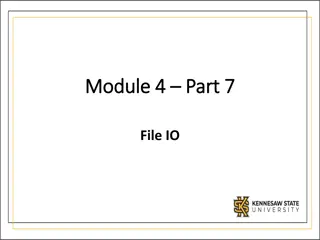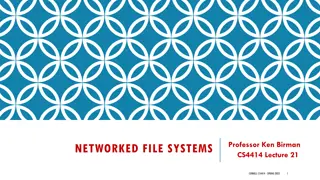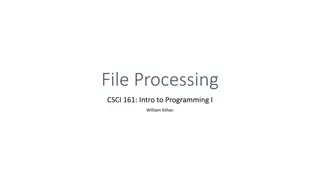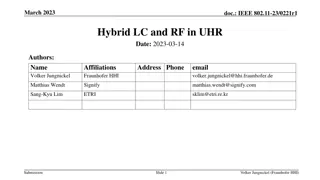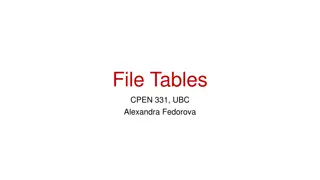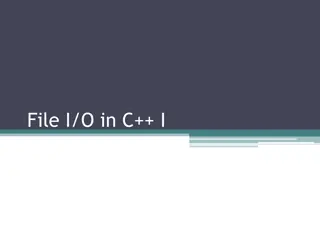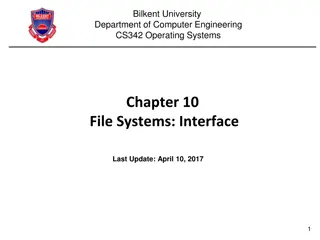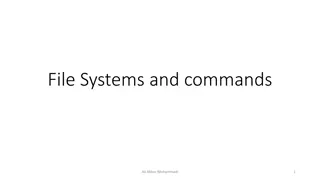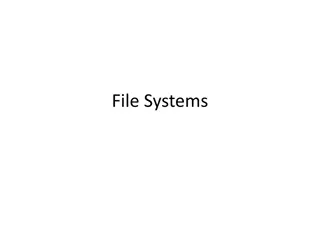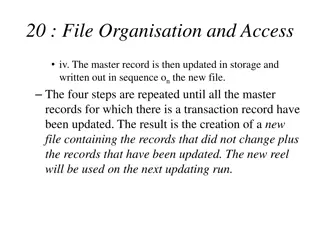Understanding File I/O and Inter-Process Communication Through Pipes
Delve into the intricacies of file operations, I/O redirection, and inter-process communication through pipes as discussed in the readings of "Advanced Programming in the Unix Environment" (APUE). Explore data structures for open files, file descriptor tables, implications of data structures, system
4 views • 18 slides
How to Fix Quickbooks Error 80070057?
How to Fix Quickbooks Error 80070057?\nQuickBooks Error 80070057 can disrupt financial management. It occurs due to file extension issues or data damage. Symptoms include inability to open files and error code display. Causes involve incorrect file extensions or firewall settings. Diagnostic tools l
1 views • 5 slides
How to Fix “The File Exists QuickBooks Error” Warning Message
How to Fix the \"The File Exists QuickBooks Error\" warning message requires a systematic approach to troubleshoot and resolve the underlying issues that cause this problem. QuickBooks, being a complex accounting software, may encounter various errors related to file management and system compatibil
0 views • 5 slides
Understanding Filesystems: A Comprehensive Overview
File systems provide a structured approach to storing and organizing data on secondary storage devices. They involve logical organization of files, directories for grouping related files, sharing data between users, and managing permissions. Files contain data with attributes like size, ownership, a
3 views • 29 slides
Operating System: File Allocation Methods
File allocation methods in operating systems determine how files are stored in disk blocks. The main methods include Contiguous Allocation, Linked Allocation, and Indexed Allocation. Contiguous Allocation involves allocating blocks in a contiguous manner for efficient disk space utilization and fast
0 views • 14 slides
Implementation of File System in Operating Systems
Various structures, such as boot control blocks and directory implementations, play a crucial role in implementing a file system in operating systems. These structures help in managing disk and in-memory data efficiently, ensuring effective file storage and retrieval. Linear lists and hash tables ar
1 views • 22 slides
Understanding System Reliability in Engineering
System Reliability in Science/Engineering involves understanding how products/systems work, as well as the ways they fail and the effects of failures. Reliability is the probability that a system will perform as expected under given conditions and play a crucial role in the design phase to mitigate
0 views • 19 slides
Understanding Reliability Functions in Data Analysis
Reliability functions play a crucial role in data analysis, providing insights into the probability of success or failure over time. This chapter delves into topics like unreliability functions, derivation processes for reliability functions using distributions like exponential, Weibull, and normal.
0 views • 19 slides
Understanding Reliability in Mechanical Engineering
Reliability in mechanical engineering pertains to the ability of a product to perform as expected over a specified period under defined operational conditions. This article delves into the factors influencing reliability, such as numerical value, intended function, product life, and operating condit
0 views • 61 slides
Understanding Research Methods: Reliability and Validity in Psychological Studies
In psychological research, understanding reliability and validity is crucial. Reliability refers to consistency in measurements, while validity focuses on whether the results accurately represent the phenomenon being studied. Ensuring both reliability and validity enhances the credibility of researc
0 views • 13 slides
Distributed DBMS Reliability Overview
This chapter delves into the critical aspect of reliability in distributed database management systems (DBMS). It explores the concepts, measures, types of faults, and the significance of maintaining atomicity and durability properties of transactions in ensuring system reliability. The narrative hi
0 views • 51 slides
Understanding Distributed File Systems
A distributed file system manages files across multiple machines on a network, providing users with a seamless experience as if they were using a local file system. This system abstracts details such as file locations, replicas, and system failures from the user, ensuring efficient and reliable file
0 views • 35 slides
Compute and Storage Overview at JLab Facility
Compute nodes at JLab facility run CentOS Linux for data processing and simulations with access to various software libraries. File systems provide spaces like /group for group software, /home for user directories, and Cache for write-through caching. Additionally, there are 450TB of cache space on
0 views • 11 slides
Understanding File System Reliability and Storage Solutions
Explore the challenges posed by machine/disk failures, the importance of transaction concepts, and strategies to ensure reliability in file systems. Learn about the implications of power loss or software crashes on data integrity, the complexities of storage operations, and the role of transactions
0 views • 48 slides
ENOVIA V6 File Name Cleanup for Data Migration
Problematic file names with unsupported characters can hinder data migration into ENOVIA V6, impacting object busname, titles, and filenames. This article proposes a solution involving filename changes, database updates, and file vault maintenance. The methodology includes SQL queries for analysis,
0 views • 5 slides
NERC Operating Committee Update & Strategic Plan Overview
The NERC Operating Committee (OC) oversees critical operational reliability matters within the electricity sector, aligning with the organization's strategic plan for the next five years. Led by Chair Jim Case and Vice-chair Lloyd Linke, the OC collaborates with various stakeholders, focusing on eme
0 views • 15 slides
Understanding Data Encryption and File Security
Exploring data encryption and file security, covering topics such as scenarios for encryption, file encryption methods, limitations, and secure file deletion techniques. Highlighting the challenges of balancing security, usability, and reliability in computer systems.
0 views • 29 slides
Understanding C++ File I/O Operations
Learn about C++ file I/O operations, including input/output instructions, file handling with ifstream and ofstream, opening multiple files, checking end of file, and a review of the file I/O process. Discover how to write to an ASCII file and read data from it in C++ programming. Practice with examp
0 views • 47 slides
Understanding File Input/Output in Java
Learn about file input/output operations in Java. Explore how to read and write data to files, handle exceptions using try/catch, work with streams, understand the process of file handling, and examine file structure examples like storing airline data. Enhance your Java programming skills by masteri
0 views • 41 slides
Understanding the FAT File System: A Comprehensive Overview
Explore the significance of the FAT file system, its history, versions, limitations, and practical applications. Learn about booting mechanisms, sector allocation, file definitions, and the challenges associated with file deletion and defragmentation. Discover the structure of a FAT disk, including
0 views • 22 slides
IEEE 2018 Emerging Technologies Reliability Roundtable Summary
The IEEE 2018 Emerging Technologies Reliability Roundtable took place in Austin, Texas, featuring speakers from various technology companies discussing topics such as software reliability, 5G network challenges, and ultra-reliability in wireless communication. The agenda included insightful talks, Q
0 views • 11 slides
ACE RAM Workshop - Barcelona 2019: Reliability and Maintenance Concepts
The ACE RAM Workshop conducted by George Pruteanu in Barcelona focused on topics such as RAM prediction, FMEA, maintenance concepts, preventive and predictive maintenance, condition monitoring systems, corrective maintenance, and design for maintenance. The workshop delved into reliability predictio
0 views • 16 slides
Overview of New York State Electric System Climate Action Council
The New York State Electric System Climate Action Council, as of October 8, 2020, oversees the bulk and distribution systems, rate case processes, utility operating revenues, residential electric bills, and statewide reliability metrics. The bulk system encompasses the NYISO-administered market for
0 views • 9 slides
Machine Learning Approach for Analyzing Service Reliability Factors in São Paulo Transit Data
Explore how machine learning methods are applied to analyze São Paulo transit data, focusing on factors affecting bus service reliability measures. The study delves into quantifying and identifying relevant factors impacting service reliability across different levels such as stops, routes, and the
0 views • 10 slides
Understanding the Basics of FAT File System
The FAT (File Allocation Table) file system organizes files on disk using linked clusters mapped to sectors. Directories store file information, linking clusters in the FAT table. This article explains the disk structure, boot sectors, and data allocation in the FAT system.
0 views • 44 slides
Understanding Reliability Theory in Engineering and Mathematics
Reliability theory, presented by S. Ithaya Ezhil Manna, explains the concept of reliability as the probability of a component functioning properly over time. The theory defines reliability in terms of the random variable X representing component life or time to failure. Key points include the defini
0 views • 22 slides
Overview of Ceph: A Scalable Distributed File System
Ceph is a high-performance distributed file system known for its excellent performance, reliability, and scalability. It decouples metadata and data operations, leverages OSD intelligence for complexity distribution, and utilizes adaptive metadata cluster architecture. Ceph ensures the separation of
0 views • 23 slides
Understanding WAFL: Write Anywhere File System in Distributed Systems
Explore the concept of WAFL in distributed systems, where appliances are preferred over general-purpose computers. WAFL addresses the unique requirements of NFS file servers, emphasizing fast performance, support for large file systems, and efficient write operations through Copy-on-write snapshots.
0 views • 27 slides
Fast File Clone in ZFS Design Proposal Overview
This document details a proposal for implementing fast file clone functionality in ZFS, allowing for nearly instant file copying through referencing. The motivation behind this proposal includes support for VMware VAAI, NAS Full File Clone, and Fast File Clone to save memory and disk space. The prop
0 views • 29 slides
Understanding File Input/Output in Python Programming
Exploring the basics of File I/O (Input/Output) in Python, including reading from and writing to text files. Learn how to read all content from a file as a string or a list, and how to write data to a file using Python's file handling capabilities.
0 views • 12 slides
Evolution of Networked File Systems in Computer Science
The evolution of networked file systems in the computer science field has been pivotal in enabling remote file storage, distributed coordination, and improved system stability. Starting from Bill Joy's innovations in the BSD version of Unix to the introduction of NFS by Sun Microsystems, the concept
0 views • 55 slides
Understanding File Processing and Input/Output Operations in Java
Gain insights into file processing and I/O operations in Java programming, covering topics such as file handling, reading files, file paths, compiler errors, exceptions, and the 'throws' clause. Learn how to work with files, handle errors effectively, and optimize your code for efficient file manage
0 views • 41 slides
Integration of Light Communications for Enhanced Reliability in Multilink Operations
The presentation discusses the integration of Light Communications (LC) into the Multilink Operation (MLO) framework to enhance reliability and reduce latency in wireless communications. By proposing the incorporation of LC as a new offloading opportunity within the MLO framework, the potential for
0 views • 15 slides
Understanding Reliability Measures in Research Supervised by Dr. Mohammed Mahdi Sharifi
Reliability is crucial for assessing the consistency of metrics in research. Various methods such as inter-rater reliability, test-retest reliability, parallel forms reliability, and internal consistency reliability help ensure the dependability of research findings. By examining factors like judgme
0 views • 9 slides
Understanding File System Calls and Operations in Operating Systems
Explore the concepts of file system calls, opening files, reading from files, setting file offsets, closing files, and maintaining file states in an operating system. Learn how to interact with files efficiently while understanding the underlying mechanisms and necessary actions for file handling.
0 views • 21 slides
Understanding File Input/Output (I/O) in C++
File Input/Output (I/O) is an essential concept in C++ programming, allowing for interaction with files stored on secondary storage devices. This involves steps like including the fstream header file, declaring file stream variables, associating them with input/output sources, opening the file, perf
0 views • 19 slides
Understanding File Systems in Operating Systems
File systems are essential components of operating systems that manage the organization, storage, and retrieval of files. This content explores the function of file systems, their interfaces, design tradeoffs, file concepts, attributes, and structures. It covers topics such as access methods, direct
0 views • 49 slides
Understanding File Systems: File Naming, Extensions, and Structure
File systems and commands play a crucial role in managing information on disks while shielding users from the complexities of storage mechanisms. This article delves into the rules of file naming, distinctions between upper and lower case letters, file extensions indicating file types, and the under
0 views • 85 slides
Understanding File System Design Challenges and Options
Exploring the complexities of file system design, this content delves into various aspects such as file layout, design constraints, data structures, design challenges, options like FAT, FFS, NTFS, and more. It discusses the challenges of locating file blocks, index granularity, free space management
0 views • 33 slides
Sequential File Maintenance and Organisation Process
In sequential file maintenance, the master records are updated and written to a new file in sequence after processing transaction records. This process continues until all relevant master records are updated, resulting in a new file with unchanged and updated records. Additional steps involve file s
0 views • 7 slides
